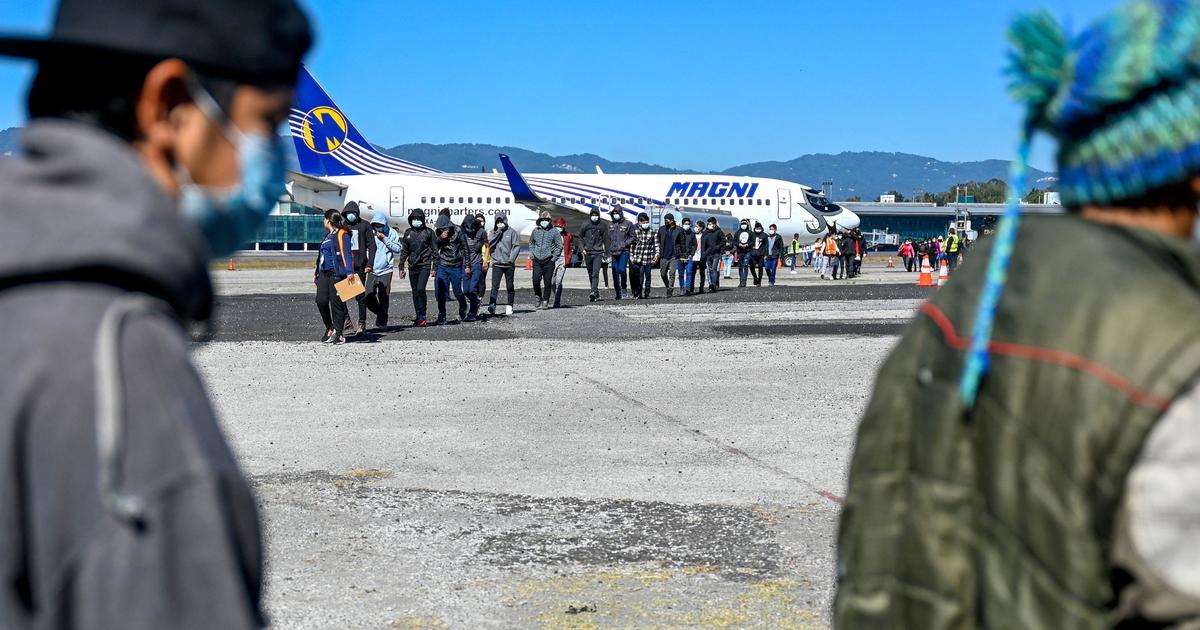Biden administration moves to limit asylum in bid to reduce border arrivals

Washington — The Biden administration published a proposal on Tuesday that would disqualify certain migrants from U.S. asylum and allow the government to deport them more quickly, saying the major policy shift is needed to curb unlawful migration to the southern border.
The regulations, which will not take effect until after the government responds to comments from the public, would render migrants ineligible for U.S. asylum if they cross the southern border illegally after failing to ask for humanitarian refuge in another country, such as Mexico. Those unable to prove they are not barred from seeking asylum under the rules could be quickly deported without a chance to see an immigration judge.
The Departments of Justice and Homeland Security, which oversee the judges and officers who review asylum cases, will give the public 30 days to comment on the proposed regulations before implementing them. The government told the Supreme Court earlier this month it plans to finalize the regulations by early May.
Once they take effect, the rules would last for two years, subject to a review that could lead to their expiration, extension or modification.
If enacted, the rules would be a seismic change to U.S. asylum policy, barring most non-Mexican migrants who cross the southern border in between designated ports of entry from requesting refuge. U.S. law gives those on American soil the right to seek asylum, regardless of whether they entered the country without permission.
The proposed regulations also represent a notable immigration policy pivot by President Biden, who campaigned on restoring access to the asylum system and overturning the hardline border policies former President Donald Trump instituted to deter U.S.-bound migration.
In 2019, the Trump administration enacted a similar regulation that also penalized migrants who crossed the U.S. southern border without first asking for asylum in a third country. That rule, known as the asylum “transit ban,” was ultimately struck down in federal court.
Advocates for asylum-seekers said the proposed regulations are the Biden administration’s version of the transit ban and have vowed to challenge them in federal court.
But the Biden administration has justified the proposed restrictions on asylum eligibility by pointing to the record number of migrant apprehensions reported along the U.S.-Mexico border in recent years. U.S. border officials processed migrants over 4 million times in fiscal years 2021 and 2022, federal figures show.
“In the absence of such a measure,” officials wrote in the regulation, “the number of migrants expected to travel without authorization to the United States is expected to increase significantly, to a level that risks undermining the Departments’ continued ability to safely, effectively, and humanely enforce and administer U.S. immigration law, including the asylum system, in the face of exceptionally challenging circumstances.”
Biden officials have rejected accusations that they are reinstating a Trump-era rule, noting their proposal will have humanitarian exemptions, including for unaccompanied children. Those eligible for an exemption are migrants with acute medical conditions, those fleeing “imminent and extreme” danger and victims of human trafficking, according to the proposed rules.
The Biden administration also argued the rule will discourage migrants from entering the U.S. illegally and encourage them to use programs the administration has set up to enter the country legally.
Those programs, announced in January, allow up to 30,000 Cubans, Haitians, Nicaraguans and Venezuelans to enter the U.S. legally each month if they have financial sponsors, and give other vulnerable migrants in Mexico the chance to request permission to enter the U.S. at an official port of entry through a mobile app.
Coupled with a policy of expelling migrants who enter the U.S. unlawfully to Mexico under a coronavirus-related public health restriction known as Title 42, the expanded legal migration channels have led to a sharp drop in illegal entries along the U.S. southern border in recent weeks.
But with Title 42 set to end once the national public health emergency over COVID-19 lapses on May 11, the Biden administration has said the U.S. needs another tool to deter unlawful border crossings.
While his recently announced strategy has slashed illegal border crossings, Mr. Biden has said it is only a stopgap fix prompted by Congress’ failure to reform U.S. immigration laws since the 1990s. The strategy could also soon face legal challenges from different directions.
The program that allows Cubans, Haitians, Nicaraguans and Venezuelans with U.S. sponsors to enter the country legally is already being challenged in federal court by Texas and more than a dozen other Republican-led states that argue the authority underpinning the policy can’t be used to admit a large numbers of migrants.
Share this news on your Fb,Twitter and Whatsapp
Times News Network:Latest News Headlines
Times News Network||Health||New York||USA News||Technology||World News
